S.R. Piccoli's Blog, page 12
November 7, 2015
Quote of the Day

 At what point, then, is the approach of danger to be expected? I answer, If it ever reach us it must spring up amongst us; it cannot come from abroad. If destruction be our lot we must ourselves be its author and finisher. As a nation of freemen we must live through all time, or die by suicide.
At what point, then, is the approach of danger to be expected? I answer, If it ever reach us it must spring up amongst us; it cannot come from abroad. If destruction be our lot we must ourselves be its author and finisher. As a nation of freemen we must live through all time, or die by suicide. ~ Abraham Lincoln, Address before the Young Men's Lyceum of Springfield, Illinois, January 27, 1838 COPYRIGHT NOTICE:
All original content of this blog [Wind Rose Hotel] is subject to
Creative Commons license (by-nc-sa)













Published on November 07, 2015 00:54
November 5, 2015
Nehemiah: Becoming a Godly Leader -- A Review
 Yet another great addition to The Bible Teacher’s Guide series by Gregory Brown. This time it’s the book of the Book of Nehemiah’s turn to be analyzed and studied in depth.
Yet another great addition to The Bible Teacher’s Guide series by Gregory Brown. This time it’s the book of the Book of Nehemiah’s turn to be analyzed and studied in depth. The Book of Nehemiah is somehow the second part of the Book of Ezra. Not by chance, as Brown himself reminds us, both the Septuagint (the Greek translation of the Old Testament) and the Latin Vulgate made them one book, calling Nehemiah “Second Ezra.” The two books tell us about the time when the Jews returned from Babylonia to their own country called Judah. The Book of Ezra—a priest and scribe—is about the first two groups of Jews who returned to Judah, and how they built their temple again. The Book of Nehemiah tells the story of a man whose name was Nehemiah—a high official at the Persian court, sent by God in order to carry out a special task, namely to help the Jews to build the walls round Jerusalem again, despite the opposition of Israel’s enemies. In turn, Artaxerxes, the king of Persia, appointed him as governor of Judah. The most important part of both Ezra’s and Nehemiah’s work, however, was showing the entire city that it should follow all of God’s laws.
Nehemiah was “a man of great integrity who feared the Lord,” and “a devout person of prayer.” He also had “a strong awareness of God’s sovereignty over all events,” as Brown points out in the Introduction. But mostly, Nehemiah and Ezra were “great leaders who God called to work together.” The first handled the practical aspects, the latter handled the spiritual. “As we consider them,” writes Brown, “we cannot but remember other great leaders who God called to work together throughout the narrative of Scripture. God called Moses and Aaron, David and Nathan, Hezekiah and Isaiah, Paul and Barnabas…”
This leads us to focus on the “background” and the “purpose” of the book of Nehemiah: God’s faithfulness to his promises—despite the fact that the people of Israel had disobeyed him and were exiled from the land, God remained faithful to his covenant with Abraham.
Among the major themes in the Book of Nehemiah are opposition (as soon as Nehemiah came to Jerusalem to rebuild the walls, those who were profiting from Israel’s misfortune began to antagonize and to mock both Nehemiah and the Israelites), prayer (as Nehemiah prays eleven times throughout the book), and leadership (Nehemiah motivated the Israelites to rebuild the wall that had been down for over 140 years, he “encouraged them to be faithful in the midst of persecution from without and turmoil from within”).
Along with the previous volumes of the series, Nehemiah: Becoming a Godly Leader is concise but thorough, scholarly enough for pastors but also simply as an expositional devotional, accessible to everyday Christians with thought-provoking and discussion-provoking questions. This book will be a very useful resource for all those committed to knowing, communicating, teaching, and living out the Word of God in every aspect of life—as men and women, fathers and mothers, sons and daughters, workers and community leaders. Highly recommended. COPYRIGHT NOTICE:
All original content of this blog [Wind Rose Hotel] is subject to
Creative Commons license (by-nc-sa)













Published on November 05, 2015 08:48
October 26, 2015
Pieve di Sant'Andrea: An Unexpected Visit
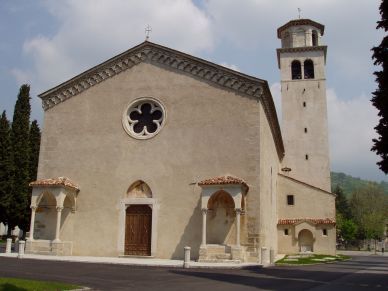 Pieve di Sant'Andrea di Bigonzo
Pieve di Sant'Andrea di BigonzoVittorio Veneto (TV)
It has been a long time since I wanted to visit the church just outside the old town of Serravalle, now part of the city of Vittorio Veneto (Province of Treviso, Veneto region). Last Tuesday I succeeded—not by my efforts, but by the grace of God, or by the hand of fate, if you prefer. In fact I was in the nearby area due to family reasons, and I had a two-hour gap… So I wandered around aimlessly, until I found myself in front of that very church, the Pieve di Sant’Andrea di Bigonzo (Parish Church of St. Andrew of Bigonzo)! When I entered the portal, the view that I could see was almost beyond description…
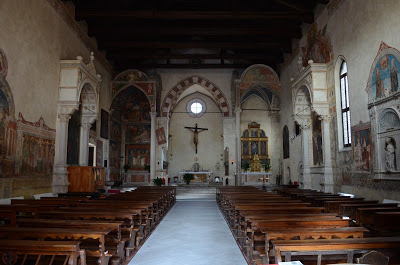 Pieve di Sant'Andrea di Bigonzo: The Interior
Pieve di Sant'Andrea di Bigonzo: The Interior The atmosphere of the interior—thanks to its beauty and its games of light and shadow, and thanks to the history that surrounds and pervades the whole—is charged with spiritual energy and sense of harmony.
Consecrated in 1303 in the presence of the Patriarch of Grado, the Pieve was built on top of a pre-existing church (probably 4th or 5th century). The hut-shaped façade is adorned with a five-sided rosette and two 16th-century shrines. The bell tower was restored in 1635 after being destroyed by an earthquake.
The inside of the church is 108 ft (33 m) long, 14 ft (45 m) wide, and 39 ft (12 m) high. The walls are entirely covered with frescoes and paintings by both known and unknown artists (among them Antonello da Serravalle, Francesco da Milano, Marco Vecello, Antonio Rosso di Cadore, Antonio Zago).
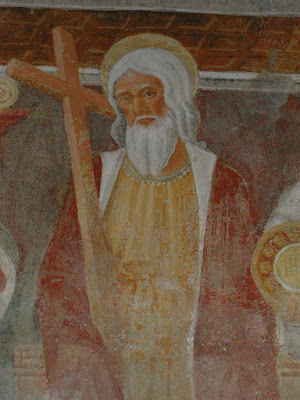 St. Andrew – Pieve di Sant'Andrea di Bigonzo
St. Andrew – Pieve di Sant'Andrea di BigonzoVittorio Veneto (Tv)
The shrine on the left of the main altar, called "Cappella dei Battuti" (1337)—after the Confraternity of the Battuti (Flagellants)—is particularly worthy of note. It contains a cycle of frescoes illustrating the life of St. Andrew.
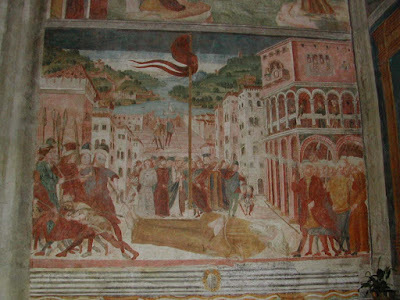 St. Andrew dragged through the street
St. Andrew dragged through the street Pieve di Sant'Andrea di Bigonzo – Vittorio Veneto (Tv)
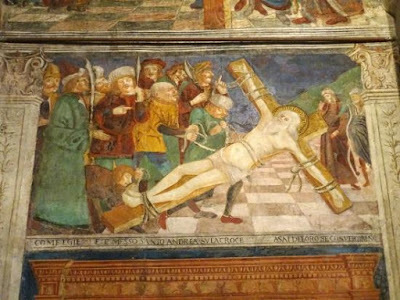 St. Andrew crucified
St. Andrew crucifiedPieve di Sant'andrea di Bigonzo – Vittorio Veneto (Tv)
Also worthy of note is the recently restored 14th-century crucifix—one of the largest and most imposing Gothic wooden crucifixes in the North East of Italy, being 89.7 inches (228 cm) high and 88.5 inches (225 cm) in width.
Needless to say, I strongly recommend to anyone living or visiting the Venice area to pay a visit to this amazing place.

Info & CreditsAddress: Pieve Sant'Andrea di Bigonzo, piazza Pieve di Bigonzo, 2 – località Sant'Andrea 31029 Vittorio Veneto, TV (Italy). Tel. +39 0438 53396.Holy Masses: see here.Restoration projects: click here to watch a selection of videos (in Italian) about some of the most important restoration projects for the church by Fondazione Cassamarca.Photos courtesy of Geoplan, Wikimedia Commons, Tripadvisor, and La Pieve di Sant'Andrea di Bigonzo (click here and here to see more photos of the frescoes and paintings).Sources: (Diocesi di Vittorio Veneto), Fondazione Cassamarca.COPYRIGHT NOTICE:
All original content of this blog [Wind Rose Hotel] is subject to
Creative Commons license (by-nc-sa)













Published on October 26, 2015 08:25
October 18, 2015
When a Book Meets Its Target Audience
 It has been said that a book is not complete until it has been read. I would interpret that statement as a book is not complete until it has met its target audience, that is those to whom the book is primarily addressed. In the case of my book,
Being Conservative from A to Z
, as the Introduction reads, the target audience includes those “conservative-minded readers”—not scholars or experts in political philosophy—who “wish to acquaint themselves with conservative political thought and to get a critical and comparative perspective on what passes for political, social, economic, and cultural conservatism in their own time and place.” Allen Bagby, who has just reviewed the book—very kindly and generously, which I highly appreciate and value—on Amazon and Goodreads, seems to perfectly correspond to the description. This means that the book is a bit more complete…but I hope this is just the first step in the right direction.COPYRIGHT NOTICE:
It has been said that a book is not complete until it has been read. I would interpret that statement as a book is not complete until it has met its target audience, that is those to whom the book is primarily addressed. In the case of my book,
Being Conservative from A to Z
, as the Introduction reads, the target audience includes those “conservative-minded readers”—not scholars or experts in political philosophy—who “wish to acquaint themselves with conservative political thought and to get a critical and comparative perspective on what passes for political, social, economic, and cultural conservatism in their own time and place.” Allen Bagby, who has just reviewed the book—very kindly and generously, which I highly appreciate and value—on Amazon and Goodreads, seems to perfectly correspond to the description. This means that the book is a bit more complete…but I hope this is just the first step in the right direction.COPYRIGHT NOTICE:All original content of this blog [Wind Rose Hotel] is subject to
Creative Commons license (by-nc-sa)













Published on October 18, 2015 16:26
The Worst Tyranny

 Of all tyrannies, a tyranny sincerely exercised for the good of its victims may be the most oppressive. It would be better to live under robber barons than under omnipotent moral busybodies. The robber baron's cruelty may sometimes sleep, his cupidity may at some point be satiated; but those who torment us for our own good will torment us without end for they do so with the approval of their own conscience.
Of all tyrannies, a tyranny sincerely exercised for the good of its victims may be the most oppressive. It would be better to live under robber barons than under omnipotent moral busybodies. The robber baron's cruelty may sometimes sleep, his cupidity may at some point be satiated; but those who torment us for our own good will torment us without end for they do so with the approval of their own conscience. ~ C. S. Lewis, God in the Dock

How true! How wise! C.S. Lewis was not only a storyteller of enduring power and enchantment, he also was a wise man and a keen political thinker. The above quote should be taught in schools from Kindergarten through University.COPYRIGHT NOTICE:
All original content of this blog [Wind Rose Hotel] is subject to
Creative Commons license (by-nc-sa)













Published on October 18, 2015 13:55
October 15, 2015
Take a Starry Night Sky, for Example...
 Vincent van Gogh, The Starry Night (1889)
Vincent van Gogh, The Starry Night (1889)Museum of Modern Art, New York City
 I think that everything that is really good and beautiful, the inner, moral, spiritual and sublime beauty in men and their works, comes from God, and everything that is bad and evil in the works of men and in men is not from God, and God does not approve of it. But I cannot help thinking that the best way of knowing God is to love many things. Love this friend, this person, this thing, whatever you like, and you will be on the right road to understanding Him better, that is what I keep telling myself. But you must love with a sublime, genuine, profound sympathy, with devotion, with intelligence, and you must try all the time to understand Him more, better and yet more. That will lead to God, that will lead to an unshakeable faith.
I think that everything that is really good and beautiful, the inner, moral, spiritual and sublime beauty in men and their works, comes from God, and everything that is bad and evil in the works of men and in men is not from God, and God does not approve of it. But I cannot help thinking that the best way of knowing God is to love many things. Love this friend, this person, this thing, whatever you like, and you will be on the right road to understanding Him better, that is what I keep telling myself. But you must love with a sublime, genuine, profound sympathy, with devotion, with intelligence, and you must try all the time to understand Him more, better and yet more. That will lead to God, that will lead to an unshakeable faith. ~ Vincent van Gogh, Letter to Theo van Gogh, July 1880

What a wonderful thought it is that the best way of knowing God is to love many things "but you must love with a sublime, genuine, profound sympathy, with devotion, with intelligence!" Take a starry night sky, for example...
COPYRIGHT NOTICE:
All original content of this blog [Wind Rose Hotel] is subject to
Creative Commons license (by-nc-sa)













Published on October 15, 2015 08:53
October 14, 2015
First Peter: How to Live as Pilgrims in a Hostile World -- A Review
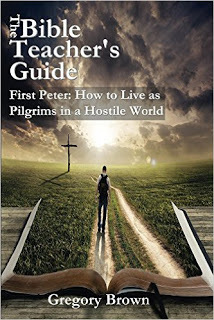 Peter was one of the original disciples who was called to follow Christ during his early ministry. He was eventually called to be one of the twelve Apostles, and as supported by a wide range of well documented evidence, he was also the head of them. “The Gospel writers,” writes Gregory Brown in his Bible Teacher’s Guide on First Peter, “focused on Peter throughout the narratives, as there is more material written about him than anybody else besides Christ. Also in the book of Acts, we see his importance in the establishment of the church. He leads the Apostles in the selection of the replacement for Judas (Acts 1) and he preaches several sermons that led to the salvation of thousands (Acts 2, 3 and 4).”
Peter was one of the original disciples who was called to follow Christ during his early ministry. He was eventually called to be one of the twelve Apostles, and as supported by a wide range of well documented evidence, he was also the head of them. “The Gospel writers,” writes Gregory Brown in his Bible Teacher’s Guide on First Peter, “focused on Peter throughout the narratives, as there is more material written about him than anybody else besides Christ. Also in the book of Acts, we see his importance in the establishment of the church. He leads the Apostles in the selection of the replacement for Judas (Acts 1) and he preaches several sermons that led to the salvation of thousands (Acts 2, 3 and 4).” Peter writes this letter to Christians in order to comfort them—with the reality of their salvation—in the midst of intense persecution by the Roman Empire. He opens his letter with a greeting to “God’s elect” who are scattered in northern Asia Minor. He calls his fellow Christians a chosen people, a royal priesthood, a holy nation, a people of God’s own possession. Then he explains how God’s people should behave: they have to abstain from sin, live good lives before non-Christians, be respectful—all Christians should respect everyone, especially those in authority...
The message of the First Epistle of Peter—usually referred to simply as First Peter and often written 1 Peter—has been immensely comforting to Christians in Muslim and Communist societies where, as it is well known, they are undergoing constant persecution for their faith. “For them,” writes Brown, “this letter has been a manual on how to live as a Christian amidst persecution. Even in Western societies this letter is becoming more relevant.” At one time, he adds, “being a practicing Christian in society was not just tolerated but honored […] now with new ideas about marriage, the woman’s right to abort her children, and many other aspects of society, persecution is constantly growing.” How true!
Gregory Brown’s Bible Teacher’s Guide: First Peter: How to Live as Pilgrims in a Hostile World is a very useful resource for all those committed to teaching, communicating, pursuing, knowing and living out the truth of God’s word in its entirety as given to us in the Bible. It may be used very profitably by individual for personal devotions, by small bible study group leaders, and by pastors for sermon preparation. Highly recommended.COPYRIGHT NOTICE:
All original content of this blog [Wind Rose Hotel] is subject to
Creative Commons license (by-nc-sa)













Published on October 14, 2015 01:34
October 6, 2015
Interview

An interview of mine with ADELAIDE—Independent Quarterly Literary Magazine (New York). Probably the best interview I've ever had.
Hope you enjoy the read!
COPYRIGHT NOTICE:
All original content of this blog [Wind Rose Hotel] is subject to
Creative Commons license (by-nc-sa)













Published on October 06, 2015 13:48
September 11, 2015
Blessed Are the Reviewers
I appreciate all feedback, from anyone, any type, any time, but it is such a blessing to receive such a wonderful review… Thank you, Kristin Spencer!
All original content of this blog [Wind Rose Hotel] is subject to
Creative Commons license (by-nc-sa)













If you are interested in meeting many complex and influential contrarians, this is the book for you.COPYRIGHT NOTICE:In addition to those points, it seems to me (an American expat living in Europe) that Piccoli is well traveled, and tries to understand other people and cultures on a complex level in stead of making assumptions based on his own familiar background. He describes himself as, European by birth, American by philosophy.” This characteristic is a rare thing to find in an author, and I appreciate it very much.
I should also note that any intellectual Christian will find this book immensely refreshing. I think Piccoli accomplishes in his book what Alfred Edersheim meant when he wrote of the parable of the talents, “It refers general to all that a man has, wherewith to serve Christ; for, all that the Christian has — his time, money, opportunities, talents, or learning (and not only ‘the Word’), is Christ’s, and is entrusted to us, not for custody, but to trade withal for the absent Master — to further the progress of His Kingdom.”
All original content of this blog [Wind Rose Hotel] is subject to
Creative Commons license (by-nc-sa)













Published on September 11, 2015 12:31
September 10, 2015
They’re Rugby Boys, Don’t You Know? -- A Review
 “The things described here are the grateful response of a Christian who has been rescued from a life of sin and death and reconciled to God for a life of hope and an eternal future in heaven.” That’s what the Author says in the biographical note (“Natalie’s Personal Story”) at the end of her book. In fact, Natalie Vellacott believed God’s promise that, ‘All who call on the name of the Lord will be saved’. And “God, by His grace, planted true faith in my heart and I determined to live a new life before Him,” as she herself recalls a few lines above.
“The things described here are the grateful response of a Christian who has been rescued from a life of sin and death and reconciled to God for a life of hope and an eternal future in heaven.” That’s what the Author says in the biographical note (“Natalie’s Personal Story”) at the end of her book. In fact, Natalie Vellacott believed God’s promise that, ‘All who call on the name of the Lord will be saved’. And “God, by His grace, planted true faith in my heart and I determined to live a new life before Him,” as she herself recalls a few lines above.Miss Vellacott, a former English Police Sergeant turned missionary to the Philippines, describes in her book, They’re Rugby Boys, Don’t You Know? how she unexpectedly encountered and fell in love with a group of street teenage boys addicted to what the locals call “rugby”—a solvent used for repairing shoes in the Philippines which also has the effect, if inhaled, to temporarily ease hunger and depression, and is known to be one of the major causes of addiction to teenagers and even children. The book chronicles some of Natalie’s ups and downs, victories and frustrations of dealing with the “rugby boys,” the many mistakes she made and the many lessons she’s learned along the way. To her each one of the boys was worth God’s love and hers as well. “My biggest piece of advice,” she writes, “is ‘start small.’ One of the smallest things we did which had the biggest impact was to learn the names of the boys and to use them. Whoever God calls you to help, I encourage you to treat them as individuals and demonstrate through this that their lives are important. Constantly remind them that it is God who loves them and that this is the reason for your concern. Don’t expect dramatic change straight away, but; be Patient, Persevere, and Pray.”
They’re Rugby Boys is an inspiring read, it’s thought-provoking, emotional, and uplifting. I am very happy to have read it.
This book is not for profit and all royalties will be paid directly to “Olongapo Christian Help and Hope” for the ongoing support of the ministry.COPYRIGHT NOTICE:
All original content of this blog [Wind Rose Hotel] is subject to
Creative Commons license (by-nc-sa)













Published on September 10, 2015 15:52



